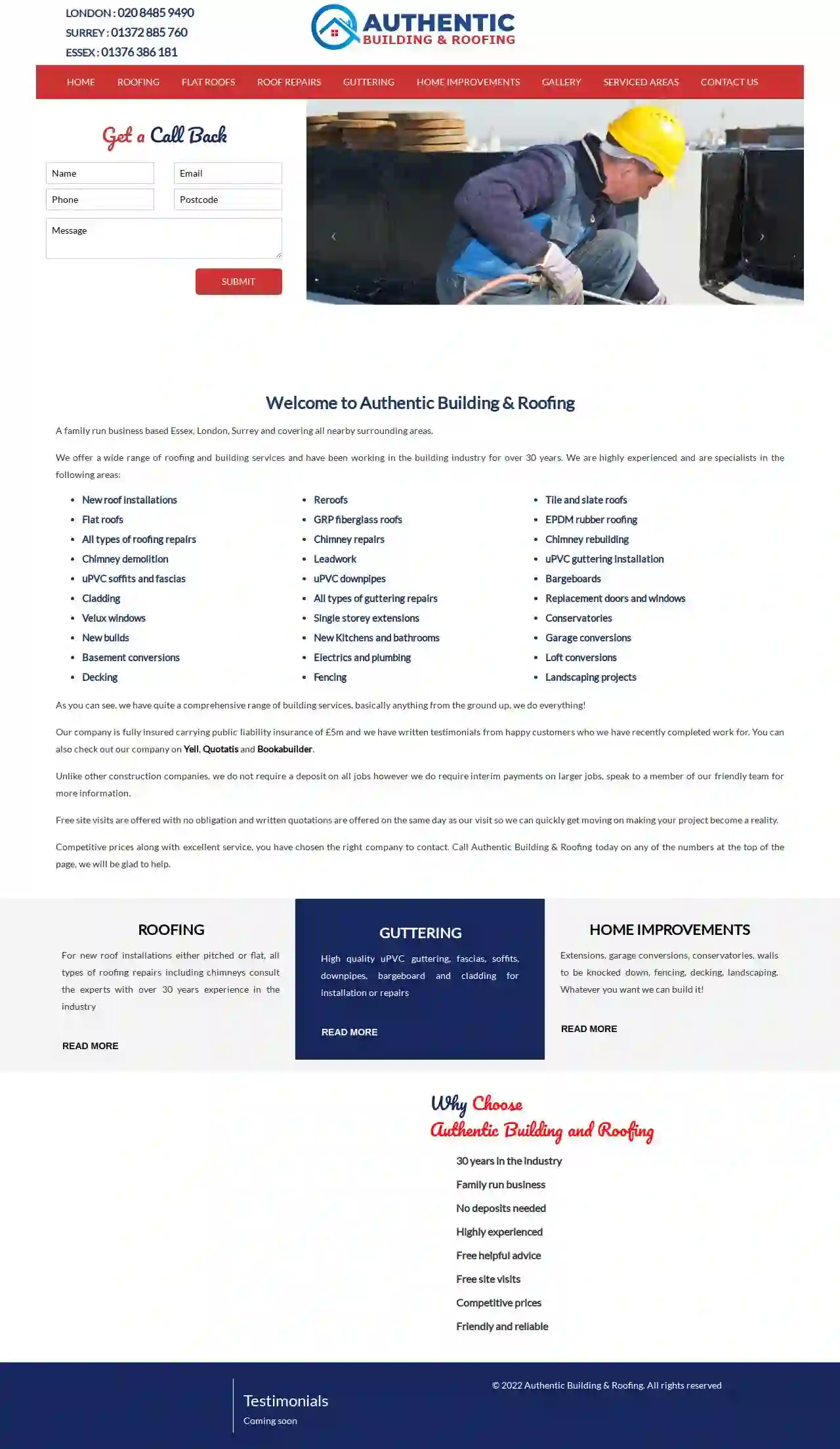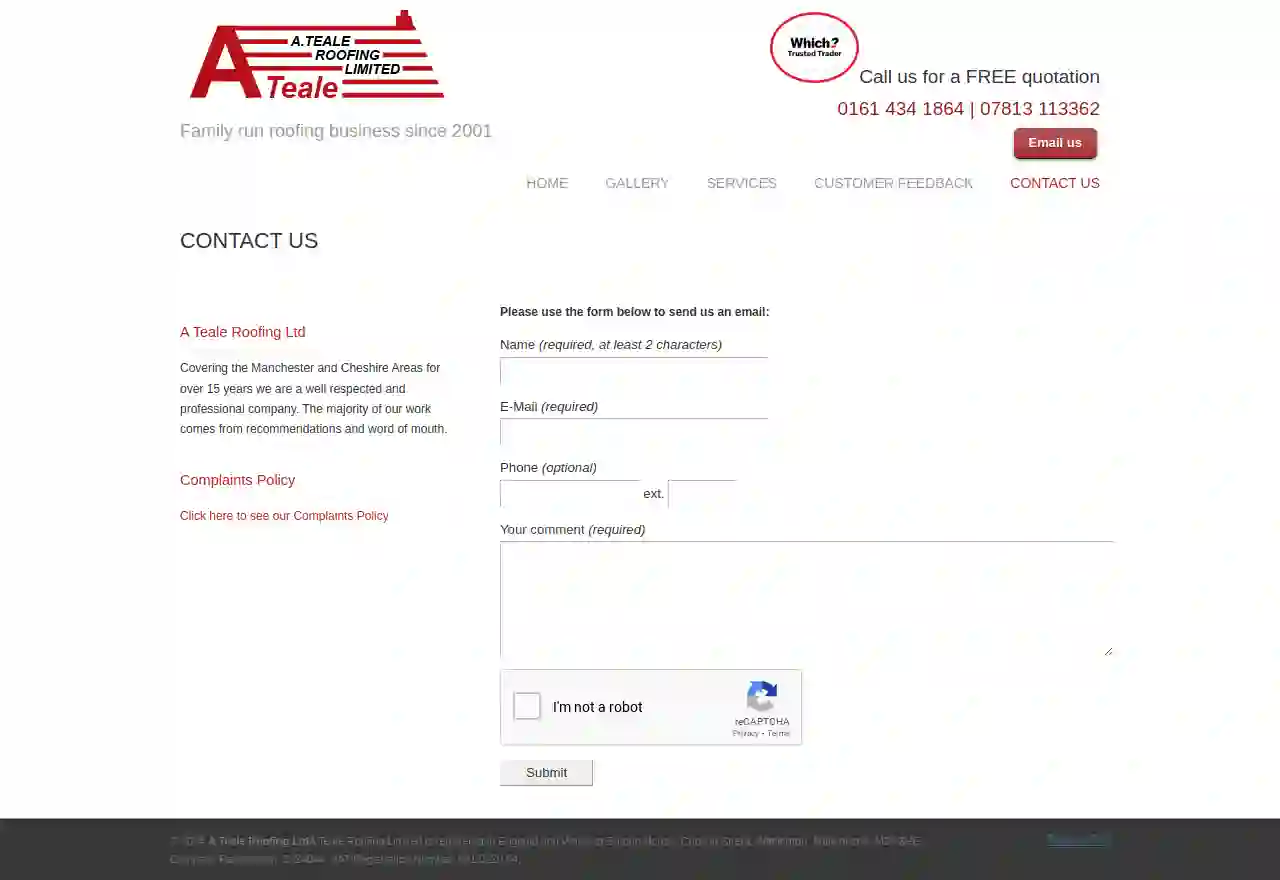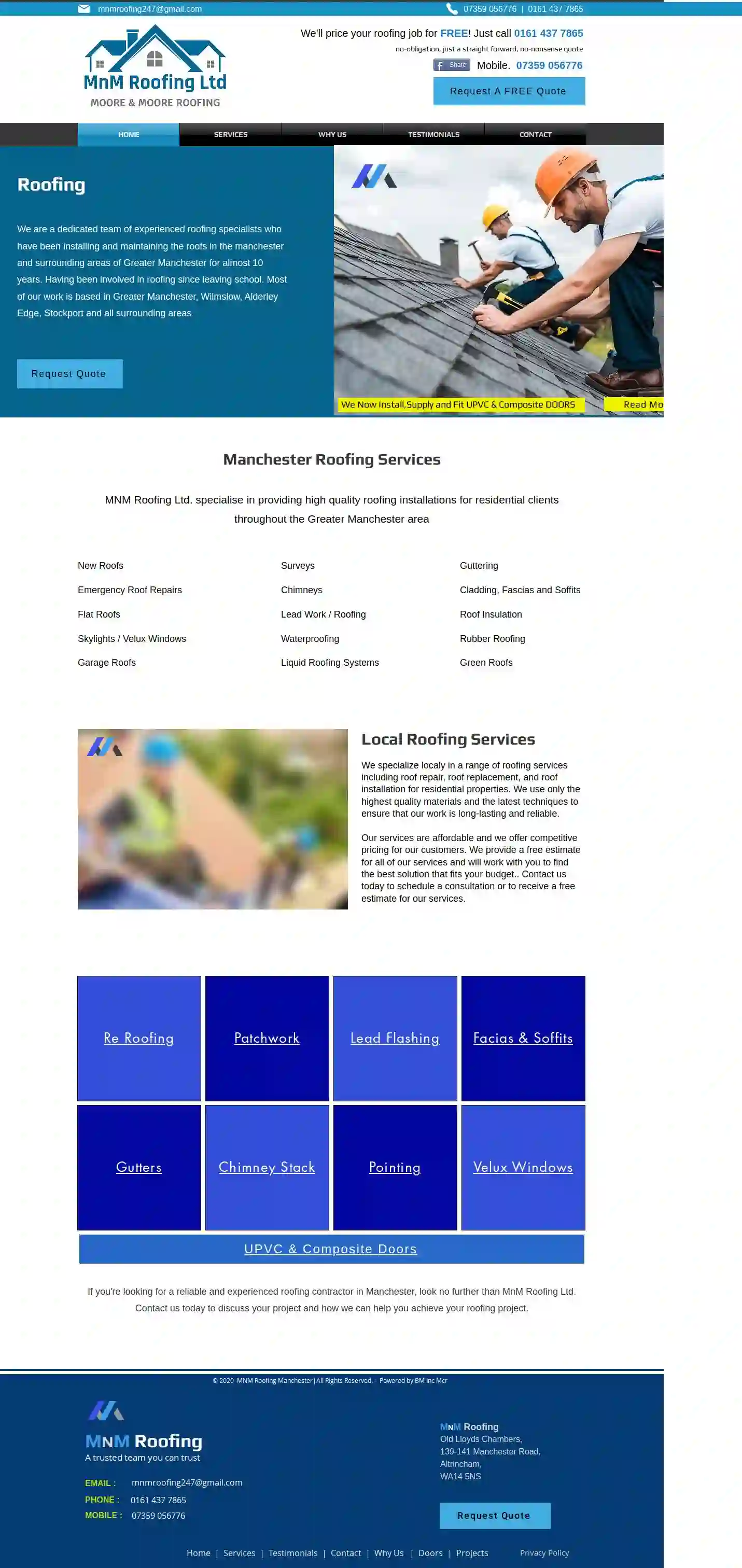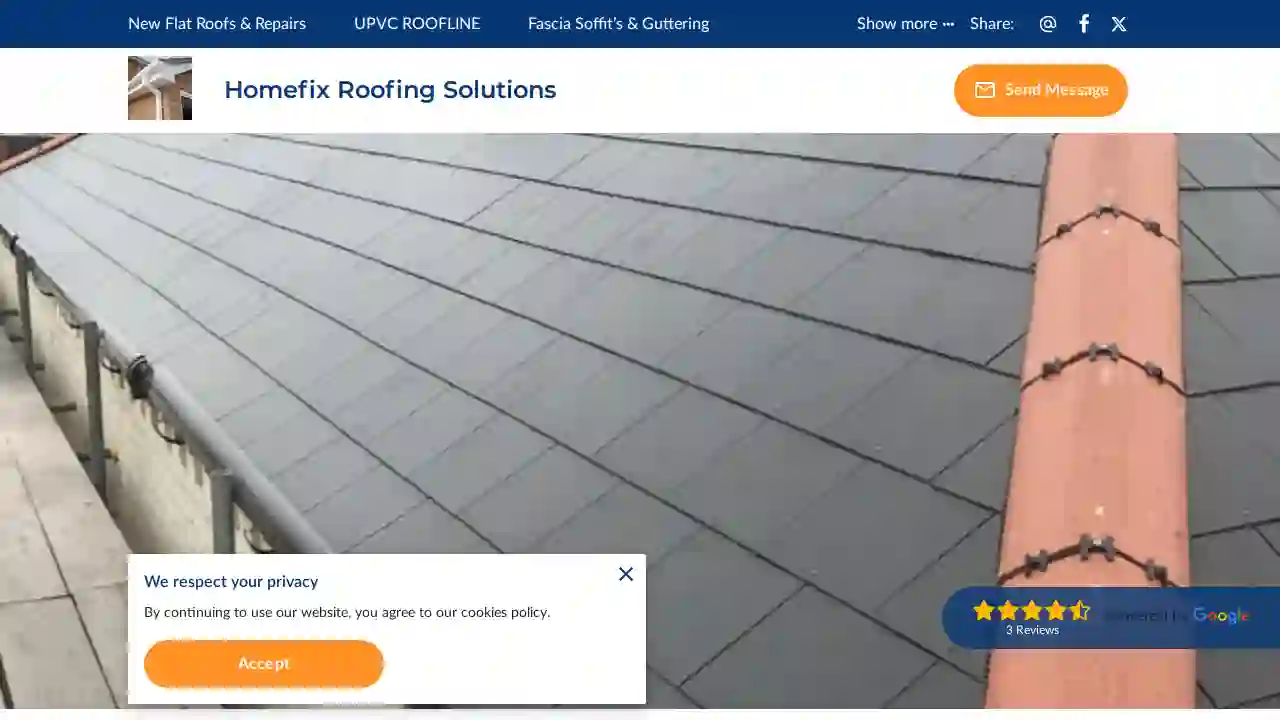Industrial Roofing Contractors Rochdale
Top Industrial Roofing Contractor in Rochdale
Receive up to 3 Industrial Roofing Services quotes for your project today! Compare profiles, reviews, accreditations, portfolio, etc... and choose the best deal.

Authentic roofing services
51 reviews75A Church Street, Witham, CM8 2JP, GBWelcome to Authentic Building & Roofing A family run business based Essex, London, Surrey and covering all nearby surrounding areas. We offer a wide range of roofing and building services and have been working in the building industry for over 30 years. We are highly experienced and are specialists in the following areas: New roof installations Reroofs Tile and slate roofs Flat roofs GRP fiberglass roofs EPDM rubber roofing All types of roofing repairs Chimney repairs Chimney rebuilding Chimney demolition Leadwork uPVC guttering installation uPVC soffits and fascias uPVC downpipes Bargeboards Cladding All types of guttering repairs Replacement doors and windows Velux windows Single storey extensions Conservatories New builds New Kitchens and bathrooms Garage conversions Basement conversions Electrics and plumbing Loft conversions Decking Fencing Landscaping projects As you can see, we have quite a comprehensive range of building services, basically anything from the ground up, we do everything! Our company is fully insured carrying public liability insurance of £5m and we have written testimonials from happy customers who we have recently completed work for. You can also check out our company on Yell, Quotatis and Bookabuilder. Unlike other construction companies, we do not require a deposit on all jobs however we do require interim payments on larger jobs, speak to a member of our friendly team for more information. Free site visits are offered with no obligation and written quotations are offered on the same day as our visit so we can quickly get moving on making your project become a reality. Competitive prices along with excellent service, you have chosen the right company to contact. Call Authentic Building & Roofing today on any of the numbers at the top of the page, we will be glad to help.
- Services
- Why Us?
- Accreditations
- Gallery
Get Quote
JM Contractors
4.752 reviewsOffice 242 30 The Downs, Altrincham, WA14 2PX, GBJM Contractors is a family-run business based in Greater Manchester, specializing in property maintenance services. With years of experience in the roofing trade, they pride themselves on providing a hassle-free and affordable service that prioritizes customer needs, quality workmanship, and modern standards. They offer a wide range range of services, including roof installations, repairs, conversions, and upgrades, as well as UPVC fascias, soffits, guttering, and pressure washing. JM Contractors is committed to exceeding customer expectations and building lasting relationships through their punctuality, honesty, reliability, and friendly service.
- Services
- Why Us?
- Gallery
Get Quote
Optimal Roofing Ltd
57 reviews24 Borley Crescent, Elmswell, IP30 9UG, GBOptimal Roofing Ltd is a leading Roofing Contractor based in Bury St Edmunds, with our services covering Suffolk, Norfolk, North Essex and Cambridge. We provide our clients with a comprehensive approach to their individual roofing requirements and specialise in a wide range of services from minor repairs and maintenance to complete re-roofs. Get in touch to discuss your roofing requirements and arrange for your free no obligation quote on: 01359 760015 or 07848 686499. We are a specialist roofing & cladding contractors company based in Bury St Edmunds, Suffolk. We specialise in the installation, maintenance and repair of all types of roofing, sheeting and cladding systems covering the domestic, commercial and industrial sectors. Optimal Roofing Ltd believes that all roofs need to be maintained regularly in order to prolong the serviceable life of the roof system. This is also true of the roof drainage as this is fundamental to protecting the rest of the building from water damage. We offer a complete roof maintenance, repair and roof refurbishment service and our time served experienced roofers are able to carry out all aspects of roof works. We cater for individual repair items to regular roof maintenance programmes and full roof refurbishment. We provide quality Craftsmanship which carried out by time served and highly skilled craftsman at Competitive Rates
- Services
- Why Us?
- Accreditations
- Our Team
- Testimonials
- Gallery
Get Quote
guardian roofing and building ltd
52 reviews41 Denshaw, Skelmersdale, WN8 0AY, GBGuardian Roofing and Contractors is your local and professional roofing contractor serving the Skelmersdale area. We are fully qualified and offer a full range of roofing, fascia, soffits, and guttering services. Whether you need a brand new roof or roof repairs, we've got you covered. With over 30 years of experience in the industry, we have helped countless people with their homes and properties. Our fully qualified and insured team ensures all work is fully guaranteed. In addition to roofing, we also undertake various building projects, including repointing, brickwork, and property renovations. Contact us today for a free consultation to discuss your roofing needs.
- Services
- Why Us?
- Our Team
- Testimonials
- Gallery
Get Quote
Roofing North West
21 reviewsGBSouth Yorkshire Roofing Network is a network of roofing professionals serving Swinton and surrounding areas. They offer a wide range of roofing services for both residential and commercial clients, including roof repairs, flat roofing, guttering, fascias & soffits, and more. The network emphasizes the importance of a well-built roof and the potential damage that even small leaks can cause. They encourage homeowners to contact them for a free quote and expert advice on their roofing needs.
- Services
- Why Us?
- Gallery
Get Quote
Wardley Hall Windows & Conservatories Ltd
4.795 reviews5 Cecil Street, Walkden, M28 3BR, GBWardley Hall Windows & Conservatories Ltd is a family-run business based in Walkden, Manchester, with over 35 years of experience in the double glazing industry. We offer a wide range of products, including windows, doors, conservatories, porches, roofline, garden rooms, canopies, and glass balustrades. We pride ourselves on providing exceptional customer service and high-quality, cost-effective installations. Our commitment to this mission allows us to become not only a premier installation company but THE premier installation company in the North West. We treat all employees fairly and involve them in the quality improvement process to ensure responsiveness and cost-effective work execution. We offer free helpful advice to all of our customers and no obligation quotes are also available. If you prefer to view before you buy, you can also visit our showroom at 5 Cecil Street, Walkden, Manchester, M28 3BR. Most of our work is gained through high recommendation and great testimonials from previous customers in Greater Manchester and the surrounding areas. Our commitment to customer satisfaction is our priority – if you aren’t happy, then neither are we. As an ASSURE registered company, we adhere closely to their code of conduct and our high standards are independently assessed on a regular basis. All of our work has an insurance backed 10 year guarantee with DGCOS (Double Glazing and Conservatory Ombudsman Scheme). We understand the importance of completing projects on time, within budget and to our own high standards and will keep you informed through every step of your project.
- Services
- Why Us?
- Accreditations
- Gallery
Get Quote
A Teale Roofing Ltd
4.511 reviewsSurcon House, Copson Street, Withington, M20 3HE, GBWelcome to A Teale roofing. A family run business since 2001. We have grown as a family business to become the established and trusted roofing company we are today. A TEALE ROOFING LIMITED Roofing specialists for all types of replacement and repair. Professional A Teale Roofing LImited meet the needs and requirements of you the customer and provide solutions to all of your roofing problems. Do not hesitate to call us today for a free estimate. Reliable Providing roofing services in the Manchester and Cheshire areas for over 20 years we are a well respected and professional company and the majority of our work comes from recommendations and word of mouth. Competitive As an employer we ensure that our team of skilled roofers work to a safe standard, while maintaining a high quality service - the type you would expect from a team that possesses expertise in all areas of the roofing industry. What We Do We cover all types of roofing From full re-roofs to storm damage repairs, we pride ourselves on our old-fashioned approach to customer service which ensures that we respond quickly, at your convenience and that we fully explain everything we do. Whether you are in the early stages of planning, or ready to start a project. Do not hesitate to call us today for a free estimate. We will be happy to answer any questions or queries you may have.
- Services
- Why Us?
- Accreditations
- Our Team
- Testimonials
- Gallery
Get Quote
LAB Roofing Services
GBLAB Roofing Services is a trusted and professional roofing contractor serving Birmingham and the West Midlands. With a wealth of experience in the industry, we pride ourselves on delivering high-quality roofing solutions to both commercial and domestic clients. Whether you require a new roof, repairs, or any other roofing service, our team of certified experts is here to help. We offer a wide range of services, including new roofs, flat roofing, lead work, roof surveys, roof ventilation, chimney repoints, fascias and soffits, GRP roofing, guttering and downpipes, single ply roofing, slate and tiling, Velux, EPDM rubber roofing, and pest control for solar panels. At LAB Roofing Services, we understand the importance of providing our clients with exceptional service and value. We are committed to delivering fair prices, flexible scheduling, and a hassle-free experience. Contact us today for a free, no-obligation quote and let us take care of all your roofing needs.
- Services
- Why Us?
- Gallery
Get Quote
MNM Roofing Ltd
55 reviews139-141 Manchester Road, Old Lloyds Chambers, Altrincham, WA14 5NS, GBMNM Roofing Ltd. is a dedicated team of experienced roofing specialists serving the Manchester and surrounding areas of Greater Manchester for almost 10 years. With a history rooted in roofing since leaving school, the company focuses primarily on Greater Manchester, Wilmslow, Alderley Edge, and Stockport. MNM Roofing Ltd. specializes in providing high-quality roofing installations for residential clients throughout the Greater Manchester area. They offer a comprehensive range of services, including new roofs, emergency roof repairs, flat roofs, skylights/Velux windows, garage roofs, surveys, chimneys, lead work, waterproofing, liquid roofing systems, guttering, cladding, fascias and soffits, roof insulation, rubber roofing, and green roofs. The company prides itself on using only the highest quality materials and the latest techniques to ensure long-lasting and reliable work. They are committed to providing affordable services with competitive pricing and offer free estimates for all their services. MNM Roofing Ltd. is a trusted team you can rely on for all your roofing needs. Contact them today to discuss your project and how they can help you achieve your roofing goals.
- Services
- Why Us?
- Gallery
Get Quote
HomeFix Roofing Solutions
4.73 reviews2 Northgate Avenue, Bury Saint Edmunds, IP32 6bb, GBHomefix Roofing Solutions is your local expert for all your roofing and guttering needs in Bury Saint Edmunds and the surrounding areas. We pride ourselves on delivering high-quality workmanship, competitive prices, and exceptional customer service. Whether you require a small repair, a complete new roof, or anything in between, our dedicated team of roofers is here to help. We offer a comprehensive range of services, including new flat roofs, UPVC roofline, fascia and soffit installation, chimney brick repairs, and more. We are committed to using the latest building regulations and techniques to ensure all projects are completed safely and to the highest standards. Our reputation for reliability and customer satisfaction is built on years of experience and a genuine passion for providing excellent service. Contact us today for a free quote and let us take care of your roofing needs.
- Services
- Why Us?
- Accreditations
- Our Team
- Testimonials
- Gallery
Get Quote
Over 12,314+ Roofing Businesses registered
Our roofing contractors operate in Rochdale & surrounding areas!
Roofyng.co.uk has curated and vetted Top Roofing Companies near Rochdale. Find the most reliable business today.
Industrial Roofing FAQs
- Identify Damage Early: Early detection allows for prompt repairs, preventing more extensive damage and costly repairs.
- Extend Roof Lifespan: Addressing minor issues extends the life of your roof, delaying the need for costly replacements.
- Prevent Safety Hazards: Identify potential safety concerns and ensure compliance with regulations, protecting workers and property.
- Maintain Business Continuity: Prevent disruptions to business operations by addressing roof issues proactively.
- Support Insurance Claims: A documented inspection report can be valuable in supporting insurance claims for storm damage or other covered events.
- Manufacturer's Warranty: Provided by the manufacturer of the roofing materials, covering defects in materials. Length varies depending on the material and manufacturer.
- Contractor's Warranty: Offered by the roofing contractor, covering the quality of their workmanship. Usually covers a shorter period than the material warranty, typically 1 to 10 years.
- Cool Roofs: Reflective coatings or light-colored materials to reduce heat absorption.
- Green Roofs: Vegetated roofs providing insulation, reducing stormwater runoff, and improving air quality.
- Solar Panels: Integrating solar panels into the roofing system for renewable energy generation.
- Recycled Content Roofing: Using roofing materials made from recycled content, reducing landfill waste.
- Durable Roofing Systems: Choosing long-lasting systems that require less frequent replacements, minimizing resource consumption.
- Safety Training: Workers trained in OSHA regulations and safe roofing practices.
- Safety Equipment: Use of appropriate safety equipment, such as harnesses, ropes, and hard hats.
- Fall Protection: Implementation of fall protection systems, such as guardrails or safety nets.
- Job Site Safety Plan: Development and implementation of a comprehensive safety plan for the project.
- Regular Safety Meetings: Conducting daily or weekly safety meetings to discuss potential hazards and best practices.
What are the benefits of a roof inspection for my industrial building?
What are the different types of warranties for industrial roofs?
What are some sustainable industrial roofing options?
What safety precautions should I expect from an industrial roofing contractor?
What are the benefits of a roof inspection for my industrial building?
- Identify Damage Early: Early detection allows for prompt repairs, preventing more extensive damage and costly repairs.
- Extend Roof Lifespan: Addressing minor issues extends the life of your roof, delaying the need for costly replacements.
- Prevent Safety Hazards: Identify potential safety concerns and ensure compliance with regulations, protecting workers and property.
- Maintain Business Continuity: Prevent disruptions to business operations by addressing roof issues proactively.
- Support Insurance Claims: A documented inspection report can be valuable in supporting insurance claims for storm damage or other covered events.
What are the different types of warranties for industrial roofs?
- Manufacturer's Warranty: Provided by the manufacturer of the roofing materials, covering defects in materials. Length varies depending on the material and manufacturer.
- Contractor's Warranty: Offered by the roofing contractor, covering the quality of their workmanship. Usually covers a shorter period than the material warranty, typically 1 to 10 years.
What are some sustainable industrial roofing options?
- Cool Roofs: Reflective coatings or light-colored materials to reduce heat absorption.
- Green Roofs: Vegetated roofs providing insulation, reducing stormwater runoff, and improving air quality.
- Solar Panels: Integrating solar panels into the roofing system for renewable energy generation.
- Recycled Content Roofing: Using roofing materials made from recycled content, reducing landfill waste.
- Durable Roofing Systems: Choosing long-lasting systems that require less frequent replacements, minimizing resource consumption.
What safety precautions should I expect from an industrial roofing contractor?
- Safety Training: Workers trained in OSHA regulations and safe roofing practices.
- Safety Equipment: Use of appropriate safety equipment, such as harnesses, ropes, and hard hats.
- Fall Protection: Implementation of fall protection systems, such as guardrails or safety nets.
- Job Site Safety Plan: Development and implementation of a comprehensive safety plan for the project.
- Regular Safety Meetings: Conducting daily or weekly safety meetings to discuss potential hazards and best practices.